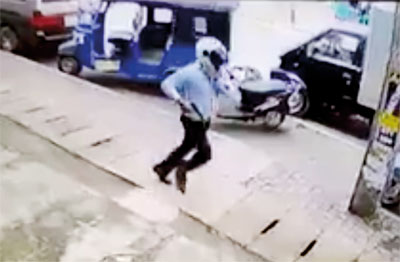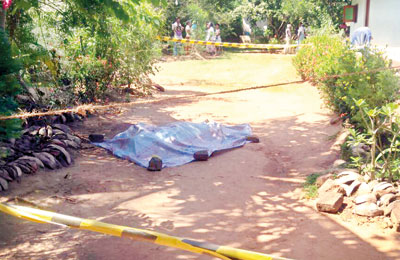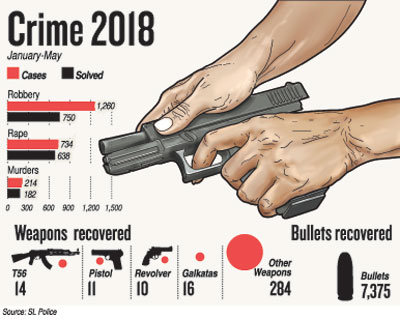News
200 gang murders and counting, cops seek public help
Law enforcement officers are asking people not to give shelter to suspected criminals, and to watch out for unfamiliar faces in their localities.

Matara jewellery robbery: The suspect fleeing with weapon in hand caught on CCTV
People fearful of an increase in organised crime feel that the State, the guardian of the rights of individuals, is failing to ensure peace, order, and security.
Police have begun to seek public support in the wake of 40 murders every month this year, along with 250 armed robberies. So far, 335 weapons or parts of weapons, have been recovered.
Significantly, 14 of the weapons recovered have been T-56 China-made assault rifles, while 11 pistols, 10 revolvers and 16 galkatas guns have been found in the past five months.
Street shootings have become common. The most recent being last Monday’s on the New Chetty Street in the capital Colombo where a man allegedly involved in the drug trade was shot. An army corporal was shot and injured on Monday on the Chakkindaramaya Road in Ratmalana. He was the official driver of a female army officer.
These attacks came three days after a morning shootout in Matara where a policemen was killed and four others, including two bystanders, were injured.
In what appears to be a first, an Israeli-made Uzi submachine gun was used in the Matara jewellery shop shootout. Police suspect the powerful gun had been smuggled into the country.
In Barawakumbura, Ambalantota, yesterday, a 42-year-old man was hacked to death at his residence. He was identified as Viharagamage Samantha.

Barawakumbura, Ambalantota: The body of the 42 year old man who was hacked to death yesterday. Pic by Rahul Samantha Hettiarachchi
Police allege he had been murdered by his elder brother over a longstanding dispute. The suspect has been arrested.
The unprecedented level of organised crime and violence has alarmed the public about their own safety.
Police spokesman SP Ruwan Gunasekara said media reports were one of the main reasons it appeared that the crime rate is on the rise. “There are instances that the media is made aware of the criminal activities even before the police are aware of it. We start checking on the incidents, sometimes only after the media has reported it.’’
He said that after the war ended, there has been widespread coverage of crime, creating the impression of more crime.
SP Gunasekara said that statistically, the number of murders had declined over the years.
According to the police, in 2013 there were 586 murders. So far, in the five months to May, there have been 214 murders.
However, according to police statistics posted on its own website, last year alone there were more than 35,000 criminal cases recorded with an average of about 100 cases of criminal incidents including house breaking, rape, sexual offences, robberies, causing grievous hurt, abductions, kidnapping and misappropriation.
Retired former STF commandant, DIG, Nimal Lewke, said that crime increases when police lose control of the ground situation.
“The police should have the confidence of the people, the question remains whether that confidence is retained now,’’ he said.
DIG Lewke said that law and order should be in the hands of the right people and the intelligence units should play a role. “The right persons should be placed in the right position.’’
He said public awareness should be created through the media such as tv and radio to prevent crime.
“The police should also create confidence among the public so that informants are protected. Something similar took place during the war. But we are not sure if that situation where the informant is protected, prevails now,’’ he said.
Commandant of the STF M R Lathif told the Sunday Times that the force will be soon launching a programme coordinated by 63 STF camps with the support of the Police Organised Crime Prevention Division to search for weapons, arrest security forces deserters, convicted criminals, and active criminals and their associates.
He said the operations will mainly be in the Western and Southern provinces.

